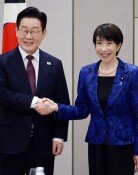'Economic security'
'Economic security'
Posted September. 02, 2019 07:28,
Updated September. 02, 2019 07:28
There is a growingly clear sign that the prosperity of the U.S. economy, considered the longest ever in history, is coming to an end. The curved, measured by the short- and long-term U.S. bond yields, showed a record wide inversion in 12 years. Longer-term bonds have a higher yield than shorter ones do due to higher risk involved. The yield curve is inverted when austerity measures lead to spikes in short-term bond yields or a future economic recession is likely to happen. It is analyzed that the recent decreases in the long-term bond yield signal an upcoming economic slump considering that the U.S. Federal Reserve pursues accommodative monetary policy. The yield curve inversion where the 10-year bond yield becomes lower than the two-year bond yield has occurred five times since 1978 in the U.S. national bond market. Unexceptionally, such an inversion was followed by a recessive economy.
A sluggishness in the U.S. economy can be translated into a slowdown in the global economy. What’s worse, a harsher and more brutal cold spell is expected to happen in Korea’s export-driven economy. Korea has overcome an economic crisis thanks to export performance. Some still argue that the 1997 Asian financial crisis, which hit severely Korea, fooled around by Western capital. However, it is worth noting that the country recorded a massive deficit back then in the current account for four consecutive years. A trade deficit led to a current account deficit. Although exchange rates partially contributed, Korea recorded a 39-billion-dollar surplus in trade in 1998, making it the first occasion in the 1990s. Thanks to this, the current account balance showed a surplus, which is the barometer of foreign transaction performance as a whole. It is a clear fact that the foreign exchange crisis was overcome by earning export dollars. Likewise, a trade deficit during the 2008 financial crisis was addressed by export increases the following year.
Export performance does not rely solely on factories producing goods in quantities. Rather than that, the government should build a trade environment to boost export. Korea is currently involved in a free trade agreement in effect with 52 partners, most of which began under the Kim Dae-jung and Roh Moo-hyun administrations. Against fierce opposition from the agricultural field, former President Kim initiated negotiations with Chile in 1999. In the meanwhile, Korea’s first FTA was signed in 2003 under the Roh administration, which later began FTA negotiations with Singapore, EFTA countries of Switzerland, Norway, Iceland and Liechtenstein, 10 ASEAN members, India, 28 EU member nations, the United States, Canada, China and New Zealand.
The incumbent Moon Jae-in administration often states that we should protect the economy by ourselves. People already know that the president’s remarks imply that economic dependency on Japan should be lowered amid Japan’s retaliatory economic measures. However, it is worrisome how far the government’s argument for “economic security” can go given that the relationship with the United States only gets worse. The problem is that the South Korean government mistakenly understands its standing in the global market and how the trade structure works. We have always protected the economy with no exception, which is clearly shown by the fact that South Korea ranks among the world’s top 20 economic powers. It is a result of how fully Korea utilized the web-like trade network system and the global breakdown structure. In that sense, business owners take a more worried look at foreign affairs, which is part of the government’s responsibility, than at the economy. The government is supposed to keep strong and close trade relationships with foreign partners when the global economy shows signs of sluggishness, which is not the case, regrettably.
In the industrialization era, large companies acquire small ones, and the trend of informatization allows fast movers to smash lagging players. Now, the key to success lies in how many friends you have in your social networks just as Google and Amazon maintain various relationships in a self-built ecosystem. The same goes for companies in an era where free trade is fading away gradually.
koh@donga.com




![[속보]美 “미국인은 이란 당장 떠나라” 대사관 긴급 공지](https://dimg.donga.com/c/138/175/90/1/wps/NEWS/IMAGE/2026/01/13/133147285.1.jpg)


